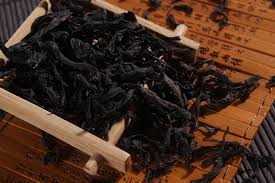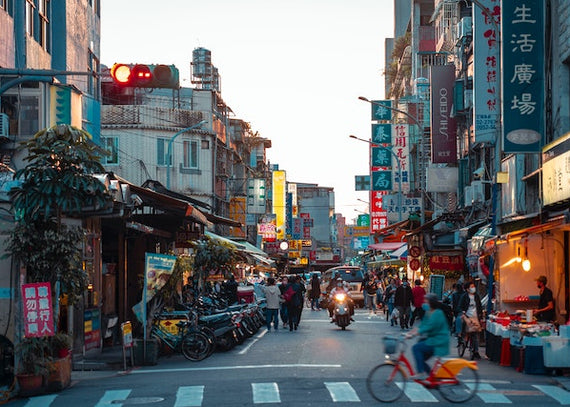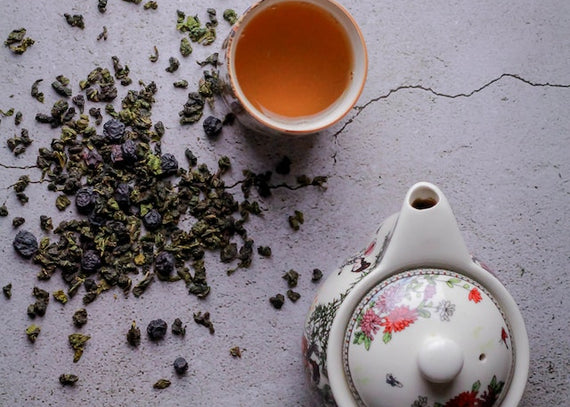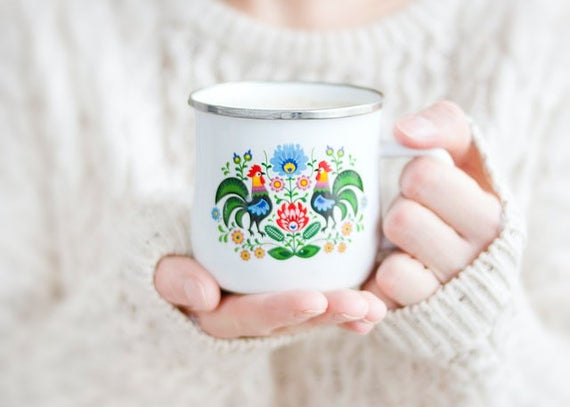CHINESE BLACK TEA
While many in the West know and love black tea in the form of Ceylon, Darjeeling, Earl Grey, and English Breakfast, Chinese black tea has a whole world of unique leaf types to offer, from Lapsang Souchong to Golden Monkey. Let us take a closer look at China's black tea!
The Origins and History of Black Tea in China
Before the late Ming and Early Qing dynasty in the mid 17th century, most of the tea enjoyed in China had been of the green and oolong varieties. The genesis of black tea is popularly retold through a story involving desperate circumstances.
The story goes that an army passed through Fujian from Jiangxi province and set up their camp in the Wuyi Mountains. Stalling the tea production, scores of tea products were left sitting idly until the army left. This event caused the leaves to oxidize longer than usual. When the local people went to check on the tea, they found the colour of the tea leaves' liquor had become red. Despite this surprising liquor colour, tea production had to go on, and after the army used up all the charcoal, the standard agent for drying tea leaves, pinewood was used instead. The strange chemical reaction between the leaves and the pinewood imbued the tea with a smoky and fruity or, Long An, flavour - thus, the story of Lapsang Souchong black tea. Moreover, the methods and style first developed with this type of black tea persisted and tinkered with, altered, and experimented on to produce a catalogue of different black tea types today.
Black tea was widely traded and even used akin to currency throughout Central Asia, Mongolia, Siberia, and the Tibetan plateau region into the 19th century. In addition to its popularity in Asia, black tea is one of the most widely consumed teas in the West. Its first interaction with the Western world also began in the 17th century, when its naming confusion began, too. "Black" tea in the West is known as "red tea" in China and many other Asian countries. The confusion came from the first encounters when the Dutch and British traders discovered teas like Lapsang Souchong and Keenum, both black teas. While the Chinese name, "red tea" refers to the colour of the tea's liquor, the Western traders, having seen the dried, darkened tea leaves for the first time called it, "black." This was also a way to differentiate between this product and green tea.
Black tea and caffeine
The caffeine level of black tea is often discussed, but so too is it often also misunderstood. To begin, when it comes to Chinese black tea often comes from the Camellia Sinensis var. Sinensis or Chinese tea plant. Meanwhile, black tea that is often consumed in the West comes from the Indian Assam variant or Camellia Sinensis var. Assamica. The Indian variant produces tea at a higher caffeine level than most Chinese teas. The methods used to oxidize Chinese tea also further decrease the level of caffeine found in the tea leaves. This process makes most Chinese black teas lower in caffeine content than Indian and Sri Lankan black teas, and much lower than coffee. There is also a traditional method utilized in the Chinese Gong Fu Cha, or "Tea with Great Skill" tradition of serving and enjoying tea. The practice involves one emptying the first initial brewing of the tea leaves to wash them. This first brewing washes away some of the caffeine content found in the tea, thus allowing a further method to reduce the caffeine content.
Chinese black tea health benefits
Chinese black tea has been enjoyed for centuries for both its rich flavours and aromas and the joy it can bring when spending time either alone or with friends. It also contains a myriad of health benefits. Some of Chinese black teas health benefits include;
Weight Loss
Consuming black tea can help to reduce fat stores in our bodies. Studies have also found that black tea can reduce our levels of "bad" cholesterol, thus beneficial to our heart health, too, because a reduction in this "bad" cholesterol can also reduce our risk of developing heart disease and stroke.
Rich in fluoride
Chinese black tea contains fluoride, which is beneficial to our teeth. This is in contrast to the idea that many caffeinated drinks such as soda, coffee, and green tea damage our dental health.
Reduces fatigue
Black tea is also a healthy stimulant that can help combat fatigue. It can stimulate our central nervous system and keep us alert. This is in part due to black tea's caffeine levels, which helps to give us energy and focus throughout the day.
Promotes strong bones
Some studies have found that black tea's flavonoids can lead to a reduced risk of bone fractures in older women.
Blood vessel health
Black tea can also aid in increasing blood vessel elasticity, which aids in blood flow and reduces our risk of strokes.
How to store black tea properly?
To store your black tea properly, make sure it is kept in a cool, dry place where there is little to no temperature or humidity changes. Tea should be sealed in an airtight container, tin or porcelain jar, rather than a bag or anything that lets the tea become exposed to too much air. Store tea away from other healthy spices or foods that may possess a strong odour. While it may seem logical to store tea alongside coffee or even other teas, your tea leaves may absorb these aromas and make for an odd tasting and smelling brew. Black teas generally have a bit of a longer shelf life than green, white or oolong teas. The average shelf life for tea is around 1 year, so black tea, if stored properly, should last for at least a year as well. For Da Hong Pao of the smoked variety, an ideal storing option is in a glazed porcelain jar and storing it in a cool, dry place that has a stable temperature and does not experience too much humidity.
Flavours of Chinese Black Tea
The flavours of black tea depend on where the leaves were cultivated and processed. The flavour profiles of Chinese black teas are diverse and differ from leaf type to leaf type. Da Hong Pao, for example, is described as having a rich and complex flavour and also possessing green overtones. Golden Tips Red has an exceptional fruity taste with a hint of peach flavour. The famous smoked tea, Lapsang Souchong is noted for being smoky of course, with pine flavours and notes. This would place many Chinese black teas in the flavour profiles fitting into the categories of green/grassy, fruity and smoky, though honey and earthy flavour profiles do exist for some Chinese black teas.
Most popular Chinese black tea varieties
Some varieties of black are not only well-known but highly prized and coveted. It may be a rare tea leaf type or an unusual style of processing that differentiates these black teas from the others. Their high quality also makes it challenging to acquire in the world tea market.
What separates Premium Lapsang Souchong from standard Lapsang Souchong is determined by the parts and leaves of the tea plant that are used. In the case of Premium Lapsang Souchong, higher-quality leaves and shoots are used. The Premium Lapsang Souchong is also processed entirely in the Wuyi mountain area following the traditional methods for Lapsang Souchong preparation.
The 1st grade part of this tea's name refers to the leaf grading system for all tea. First grade refers to tea leaves that are not only larger, retaining more of their constitution, including the delicate leaf tips, but also can release more flavour and aroma as they unfurl when brewed. As Keenum is already a delicious and high-quality black tea, Keenum leaves of the 1st-grade calibre are certainly out of this world.
Golden Tips Red Tea (Dien Hong)
Also known as "Yunnan red tea," the Golden Tips refers to the high quality, high grade, and delicate leaf tips that are harvested for this tea. This tea preserves a great deal of the delicate leaf buds and qualifies as a higher grade or "Pekoe" variety of black tea. The taste of this variety of tea leaves is often regarded as very smooth with little astringency and almost no bitterness. It is, without a doubt, a fantastic tea leaf type.
This regal black tea originated in China's Fujian province. Fujian is the birthplace to many amazing teas, and Lapsang Souchong is among them. Also known as "smoked tea" Lapsang Souchong leaves are unique because they are smoke-dried over pine fires. This procedure imbues the leaves with a smoky, pine aroma-infused taste. Lapsang Souchong's flavour and character are strong and bold, containing heart-healthy properties found in its generous supply of antioxidants. Our Lapsang Souchong is a savoury and delicious tea. Enjoying our Lapsang Souchong will make you reminisce of campfires and the ambient aroma of autumn. Even in a scorching hot office building in a city!
The name "Keenum" comes from the transliteration of this tea's home county of Qi Men. This tea comes from Anhui province, another powerhouse of tea mastery in China. Anhui's proximity to the Yangtze River and the Yellow Mountains provides an excellent environment for tea cultivation. Keenum Panda has an earthy, fruity, and wine-like flavour, aromas and notes. The striking reddish liquor of this tea looks impressive in any cup and certainly will cause a conversation, or ten. Keenum Panda is a fantastic tea for before, during, or after dinner, or anytime!
Black dragon pearls come from Yunnan, the same province that famously produces pu'erh. Black dragon pearl tea is a rolled tea with a taste as grandiose as its name. Black dragon pearls are produced by plucking the leaves and buds from the Camellia Sinensis plant. The leaves are then left to wither before they are hand-rolled together and left to oxidize more. The taste of this tea is vivacious, with descriptions noting it has an almost spicy flavour that is dynamic alongside chocolaty and sweet flavour notes. Black dragon pearls are sure to make an unforgettable cup! Black dragon pearls are great morning or pre and post-lunch teas.
Envision a long, slender, furry arm darting towards a tea bush. Agile, yet fuzzy fingers pluck a choice leaf or two in one artless grasp. Alternatively, so goes the legend of this tea's name. Originating in Hunan province, monkeys were said to pick the leaves of this tea type. Today, the practice of training monkeys to pluck tea leaves has most likely ceased, but the same measured grace and deliberate power used to pluck these unusual leaves are practiced today. Our Monkey Picked Golden tea is the best of the best. The leaves are the colour of gold, indicating their superior quality. The flavour is savoury with hints of oak.
Dahong Pao Black tea is a black tea that should be called gold. The Dahong Pao tea bush is found in China's Wuyi county in Fujian province. This famous tea region produces a score of unusual teas, and Dahong Pao is easily one of the priciest of them all. The Dahong Pao comes from a variant of the Camellia Sinensis that only grows in Wuyi, so it is hard to reproduce. This is part of the reason the price of this tea is often "fit for an emperor." The tea leaves are tightly rolled, young tea leaf shoots that possess well-developed buds. Dahong Pao has a unique health benefit some other teas lack, and that is the vitamin C it also provides. The aroma is floral and the liquor a bright orange-yellow that gives this tea deep, living amber colour. The taste is florally sweet. This tea is more than worthy of being part of a tea connoisseurs' repertoire.
Black tea is already loaded with antioxidants and weight-loss promoting enzymes and amino acids. However, black tea with the addition of Osmanthus flowers is guaranteed to help shed excess pounds and keep you feeling and looking great! Osmanthus tea synergizes amazingly with black tea, together they act as a natural detox for our bodies and can even provide some nutrients and minerals into our diets. For those looking for a health-conscious weight loss and appetite suppressant tea, Osmanthus black tea is a perfect choice!




